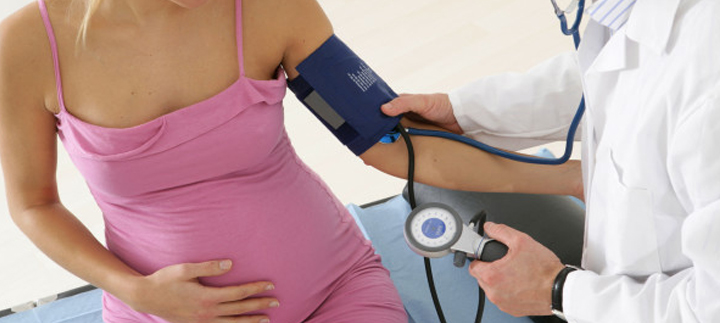Pregnancy is the most beautiful experience in a woman’s life. It is an amazing and adventurous journey. During this crucial time, maintaining good health and taking proper care of yourself is highly important for both you and your growing baby. This is the time when you need to maintain a healthy lifestyle, eat healthy food, exercise well, take adequate rest, stay away from bad habits and most importantly maintain your blood pressure & cholesterol levels.
What is Hypertension?
Hypertension or high blood pressure is a chronic medical condition in which a person’s blood pressure is higher than 140/90 mm Hg. Blood pressure indicates how much pressure blood exerts on the artery walls when a person’s heart beats .A higher blood pressure increases the risk of heart diseases and heart failures. It can also lead to kidney diseases, enlarged heart and stroke.
Hypertension in Pregnancy
Hypertension is the most common problem in pregnancy. It is the leading cause of maternal mortality and morbidity. Although many pregnant women with high blood pressure give birth to health babies but sometimes it can be dangerous for both fetus and mother. The 3 forms of hypertension that a pregnant woman can get are:
Chronic Hypertension
It is a condition when a woman already has hypertension before pregnancy or in the early days of pregnancy.
Gestational Hypertension
Gestational hypertension or pregnancy induced hypertension PIC is a medical condition when a woman develops high blood pressure after 20th week of pregnancy.
Pre-eclampsia
It is the most severe form of hypertension during pregnancy. It usually affects a woman during the 2nd half of pregnancy. It can be caused by either gestational hypertension or chronic hypertension.
Risk Factors of Hypertension
Hypertension during pregnancy may sometimes have negative impact on the baby. The baby may not get enough blood and oxygen in the womb which can result in slow growth of the baby. Hypertension may even increase the risk of premature birth. In case of pre-eclampsia, there may be more serious complications like eclampsia, cardiovascular diseases, heart attack, stroke, placental abruption, etc.
Who is at Risk?
- Women who are too young or too old (under 20 or over 40)
- Women who have a family history of hypertension
- Women having chronic diseases like diabetes
- Women who are obese or overweight
- Women who developed pre-eclampsia or hypertension during a previous pregnancy
- Women having kidney disease, lupus, rheumatoid arthritis or scleroderma.
- Women who became pregnant more than 1 time.
Prevention of Hypertension
Eat Healthy
You are supposed to eat healthy right from the time you decide to take the big responsibility of motherhood. You should consume a variety of nutritious food so that you get all the required nutrients. During your entire pregnancy, you need to eat more calories for increasing your energy levels. You should take more proteins, vitamins and minerals such as iron and folic acid. You should choose food that is high in fiber such as pasta, cereals, whole grain bread, rice, etc. Do not forget to consume more and more fruits and vegetables. You should also consume calcium rich food and at least 4 servings of dairy products. You will also need 250 micrograms of iodine every day in order to ensure that your baby’s brain and nervous system is developing properly.
Say a Big No to Smoking & Alcohol Consumption
Do not forget that during your pregnancy, smoking and consuming alcohol can hurt your baby. They are known to increase your blood pressure. During this crucial time whatever you are taking into your body is reaching your innocent baby too. It is therefore very important to stay away from all types of bad habits during your pregnancy. Excessive drinking can even lead to miscarriage in the early stages of pregnancy. It can also lead to premature birth, low birth weight or fetal alcohol syndrome (FAS), a medical condition in which a baby is born with physical and mental disabilities.
Reduce Salt Intake
Though salt is essential to your health during your entire pregnancy but consuming too much salt can be harmful. Excessive intake of salt can increase your blood pressure levels. Kidneys are affected by high intake of salt, causing the body to retain water and this extra fluid will result in greater blood volume, causing your blood pressure to rise. A low salt diet during the 9 months of your pregnancy will help you keep your blood pressure in a normal range, reducing the risks of stroke, heart attack, kidney failure as well as other serious medical problem.
Exercise Well
Exercising during pregnancy is very important. It can reduce your blood pressure levels dramatically. It improves your strength, muscle tone and endurance and hence helps you to adapt to the changes that your pregnancy brings. It will prepare you for the challenges of birth labor. Regular exercise will reduce your stress and keep you happy. It will improve your mood as well as give you energy. It will also help you to sleep peacefully. The best kinds of exercises during pregnancy are swimming, walking, running, dancing and aerobics.
Reduce Your Stress
Reducing your stress during your pregnancy can keep your blood pressure levels normal. So you must ensure that you are getting adequate rest and you are not physically exhausted or stressed. For reducing your stress, you can try to join some yoga classes or even try meditation. Apart from this, eat well and go to bed early. Try to spend some quality time with your family and be happy.


